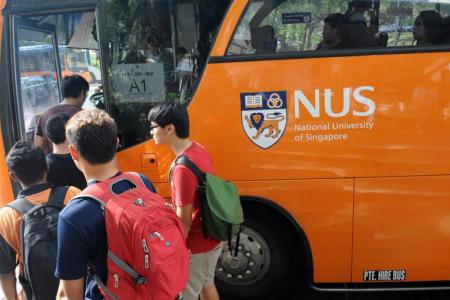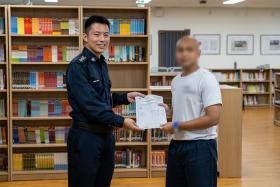O-level scores of poly grads will no longer be part of uni admissions
Polytechnic graduates applying to the National University of Singapore (NUS) and Nanyang Technological University (NTU) from 2020 will no longer have their O-level scores considered as part of their admissions, with the exception of some courses.
The changes to the University Admissions Score (UAS), a framework used by Autonomous Universities (AUs) to rank and benchmark applicants, will drop the requirement of 20 per cent weightage given to O-level results, announced the Ministry of Education yesterday.
In the current system, only NUS and NTU compute the UAS to comprise 80 per cent of the poly grade point average (GPA) and 20 per cent of the O-level results.
The other four AUs do not "hardcode" O-level results when evaluating polytechnic applicants, and instead consider various factors such as GPA, aptitude tests and interview performances, and take into account O-level results only where relevant, said MOE.
Speaking on these changes, Second Minister for Education Indranee Rajah said: "This, along with other initiatives such as the Discretionary Admissions, is in line with the other changes we have made to our education system to allow students with different learning styles to be evaluated more holistically.
"It also better recognises late-bloomers and creates more opportunities for those who flourish after discovering their interest when they are older."
MOE also said the change is due to a more diverse profile of polytechnic upgraders.
Close to a quarter of all students who enter poly do not possess O-level qualifications - for example, students who enter via the Polytechnic Foundation Programme.
Some Institute of Technical Education graduates also pursue a diploma without having done O levels.
However, MOE added that AUs can continue to impose subject-specific prerequisites or refer to specific subjects or modules to ascertain the applicants' suitability for the course that they are applying for.
NTU's provost Ling San said that each year, the university sees more applicants with poly diploma qualifications without having taken the O levels.
Agreeing with the change, Professor Ling said: "Given the diversity of students' prior backgrounds, it would be fairer to look at mainly their polytechnic results for university admission, but we will still consider their O-level results where applicable."
Mr Muhammad Haziq, 25, is a final-year social work student at NUS. Although he did well in both poly and secondary school, he too welcomes the change.
He said: "O levels are a thing of the past once you get into a poly.
"I don't think it is fair for those who did not do well for O levels but aced poly to be penalised when applying for a university." - ADELINE TAN
500 more pupils offered secondary school places via MOE’s move
Five hundred more pupils were offered places in secondary schools of their choice via Direct School Admission (DSA) this year.
The increase came after the Ministry of Education allowed secondary schools to accept up to 20 per cent of their non-Integrated Programme Secondary 1 intake via DSA.
This resulted in 3,000 pupils getting confirmed offers from schools this year, compared to 2,500 last year.
The rise in capacity, from 5 per cent for schools with distinctive programmes and 10 per cent for autonomous schools, has resulted in some schools introducing new talent areas for pupils to enter via DSA. The areas can range from scientific investigation to badminton.
About 143 out of 153 schools participated in the 2018 DSA-Secondary Exercise, of which 129 schools gave confirmed offers.
Jurong Secondary School is known for its basketball and volleyball. This year, it introduced science communication and research and service leadership as part of its DSA talent areas.
Uptake for these areas has been positive, with about 20 out of 50 applications applying for these areas in the recent exercise, said principal Ruby Tan.
She said: "When the idea of 20 per cent came out, we were deciding on expanding the existing talent areas. But you can have only so many players in one team, so what is the value of expanding the same sport?
"Since science and research are areas we have been growing in, why not expand it?"
In service leadership, students are put through group interviews and scenarios and assessed if they have a heart for serving the community and whether they can lead others in doing the same.
For science communication and research, they are assessed on their passion for science and their scientific skills, such as precision and accuracy during experiments.
Madam Tan added that the school plans to introduce another talent domain, environmental studies, next year and will continue to introduce more over the next few years.
More emphasis will also be placed on potential during the selection.In Jurong Secondary School, teachers are trained to identify pupils with potential, such as when selecting athletes, how to gauge their ball sense or flexibility in responding to instructions given on a court. - ADELINE TAN
Get The New Paper on your phone with the free TNP app. Download from the Apple App Store or Google Play Store now



